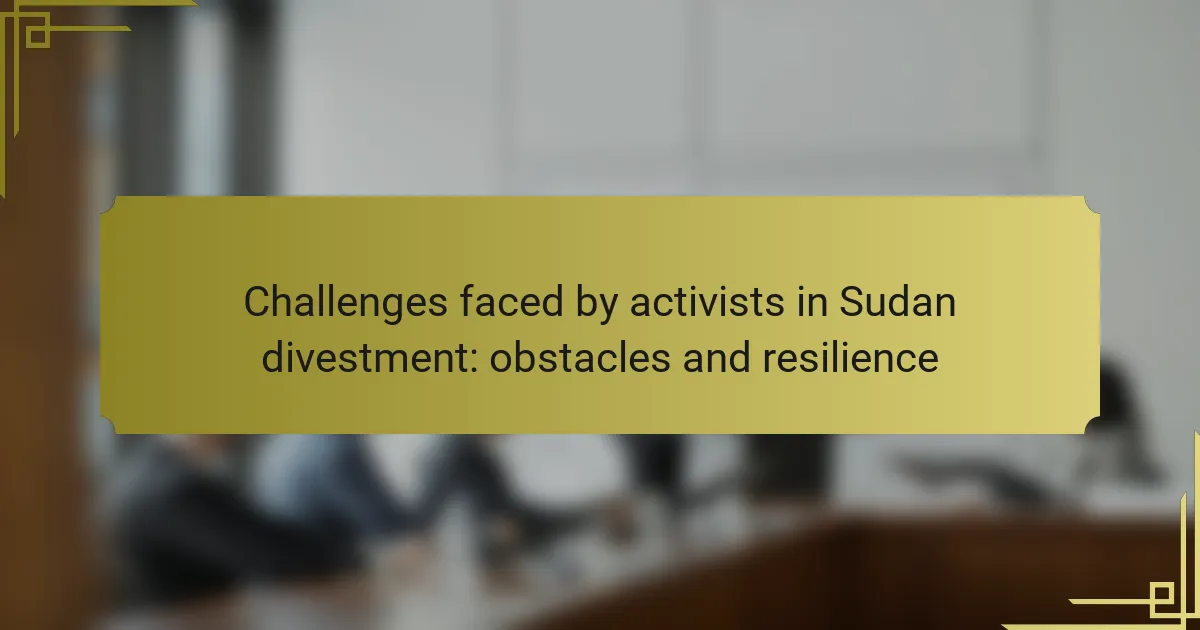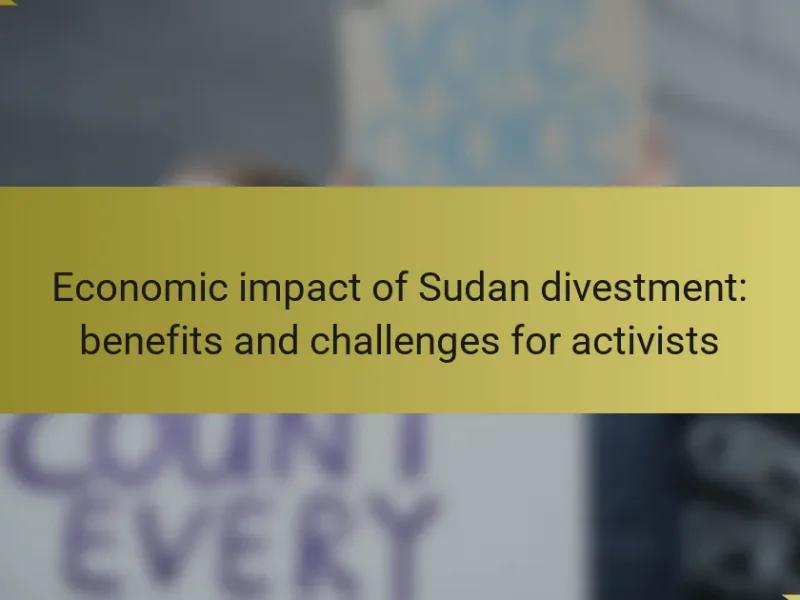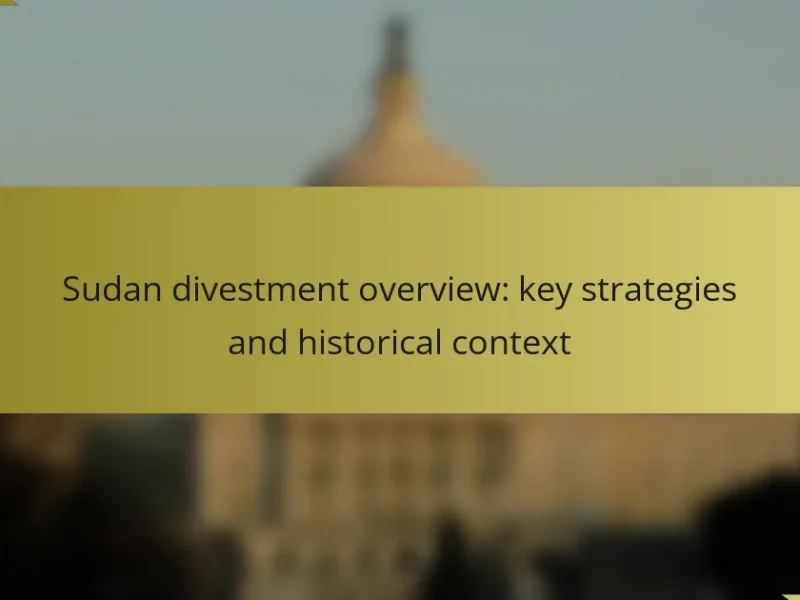Activists in Sudan divestment face numerous challenges, including a lack of transparency in government operations, resistance from powerful economic interests, and a volatile political climate that can suppress dissent. They often struggle with limited resources and funding, communication barriers due to restricted internet access, and public apathy towards divestment issues. Despite these obstacles, activists demonstrate resilience by forming coalitions, utilizing social media for outreach, and learning from setbacks to refine their strategies. The article highlights key lessons from these efforts, emphasizing the importance of grassroots mobilization, coalition-building, persistence, and transparency in driving social change related to human rights abuses in Sudan.
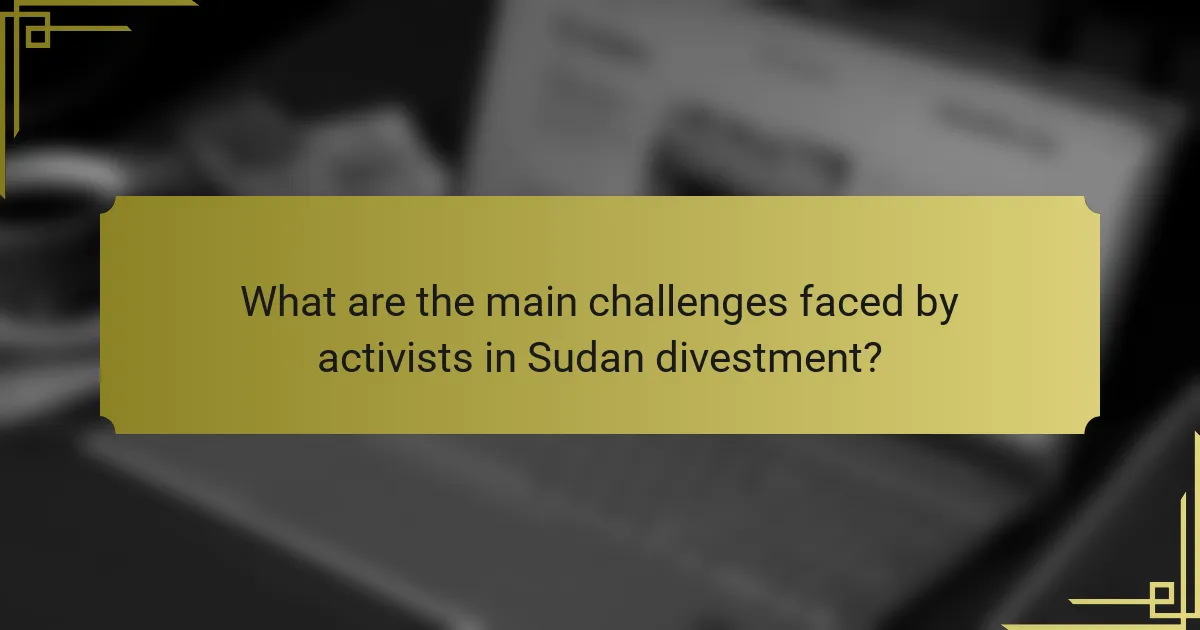
What are the main challenges faced by activists in Sudan divestment?
Activists in Sudan divestment face significant challenges. One major challenge is the lack of transparency in government operations. This makes it difficult to track investments linked to human rights abuses. Additionally, activists encounter resistance from powerful economic interests that benefit from the status quo. The political climate in Sudan is also volatile, which can lead to repression of dissent. Moreover, activists often lack access to resources and funding for their campaigns. Communication barriers exist due to limited internet access and media restrictions. Finally, there is a general public apathy towards divestment issues, complicating efforts to mobilize support.
How do political factors impact Sudan divestment efforts?
Political factors significantly impact Sudan divestment efforts. The Sudanese government’s policies create an unstable environment for investors. Political instability, including conflicts and regime changes, deters foreign investment. Sanctions imposed by various countries also complicate divestment initiatives. Activists face challenges in mobilizing support due to government repression. The lack of transparency in governance further hinders divestment efforts. Additionally, international political dynamics influence the effectiveness of sanctions and divestment campaigns. These factors collectively create a complex landscape for activists striving for divestment in Sudan.
What specific political obstacles do activists encounter?
Activists encounter several specific political obstacles in their efforts. These include government repression, which often manifests as harassment or detention of activists. Additionally, restrictive laws limit freedom of assembly and expression. Activists also face censorship of their communications and media. Political corruption can hinder their ability to mobilize support or access resources. Furthermore, lack of political representation means their voices may be ignored in decision-making processes. In many cases, activists deal with misinformation campaigns that undermine their credibility. These obstacles collectively impede their efforts to advocate for change effectively.
How do government policies affect activist strategies?
Government policies significantly shape activist strategies. Policies can either facilitate or hinder activism efforts. For instance, restrictive laws may limit protest activities. This can force activists to adopt more covert methods. Conversely, supportive policies can provide a platform for public demonstrations. Activists may leverage legal protections to amplify their message. Historical examples include the Civil Rights Movement, where favorable legislation empowered activists. In Sudan, government actions directly influence the effectiveness of divestment campaigns. These dynamics dictate how activists mobilize resources and engage with the public.
What social challenges hinder activism in Sudan divestment?
Social challenges hindering activism in Sudan divestment include government repression and limited freedom of expression. Activists face threats of violence and arrest for advocating divestment. The Sudanese government often suppresses dissent, creating a climate of fear. Additionally, societal divisions weaken collective action. Ethnic and political tensions complicate unity among activists. Economic instability further distracts public attention from divestment issues. Limited access to information restricts awareness of divestment benefits. These factors collectively stifle effective activism in Sudan.
How does public perception influence activist efforts?
Public perception significantly influences activist efforts by shaping the level of support and engagement they receive. Positive public perception can lead to increased visibility and funding for initiatives. For example, when the public views an issue as urgent, activists may gain more traction and resources. Conversely, negative perceptions can hinder efforts and lead to decreased participation. Research indicates that campaigns with strong public backing are more likely to succeed. Activists often tailor their messaging to align with public sentiment, aiming to foster a favorable view. Thus, public perception acts as a critical barometer for the effectiveness of activist movements.
What role does community support play in activism?
Community support is crucial in activism as it provides resources, solidarity, and legitimacy. Activists often rely on community backing to amplify their messages. This support can manifest in various forms, including financial contributions, volunteer efforts, and public demonstrations. For instance, research shows that movements with strong community ties are more likely to sustain momentum and achieve their goals. A study by the Stanford Social Innovation Review highlights that grassroots support can significantly enhance the effectiveness of advocacy efforts. Additionally, community support helps in mobilizing larger audiences, increasing visibility, and fostering a sense of shared purpose among activists.
What economic barriers do activists face in Sudan divestment?
Activists face significant economic barriers in Sudan divestment. Limited financial resources hinder their ability to mobilize campaigns. Many activists operate with minimal funding, restricting outreach efforts. The Sudanese economy suffers from instability, impacting investment opportunities. International sanctions complicate financial transactions for divestment initiatives. Additionally, foreign investors may fear backlash or reputational damage. This creates a chilling effect on potential supporters. Access to alternative funding sources is often constrained. These factors collectively impede effective divestment strategies in Sudan.
How do funding issues affect activist initiatives?
Funding issues severely limit activist initiatives. Insufficient financial resources restrict campaign reach and effectiveness. Activists may struggle to cover basic operational costs. This includes expenses for outreach materials and event organization. Limited funding can hinder the ability to mobilize supporters. It often leads to reduced visibility in media and public forums. According to a report by the National Council for Nonprofits, 70% of nonprofits reported funding challenges affecting their programs. This statistic highlights the widespread impact of financial constraints on activism. Ultimately, funding issues can lead to decreased momentum and diminished impact of initiatives.
What impact do economic sanctions have on activism?
Economic sanctions can significantly hinder activism. They often restrict resources and funding available to activist groups. This limitation can reduce their capacity to organize and mobilize effectively. Additionally, sanctions may lead to increased government repression. Governments may use sanctions as justification to crack down on dissent. Activists may face heightened surveillance and harassment. Furthermore, economic sanctions can create divisions within activist movements. Disagreements may arise over strategies and goals in response to the sanctions. Overall, while sanctions aim to pressure regimes, they can inadvertently stifle the very activism they seek to support.
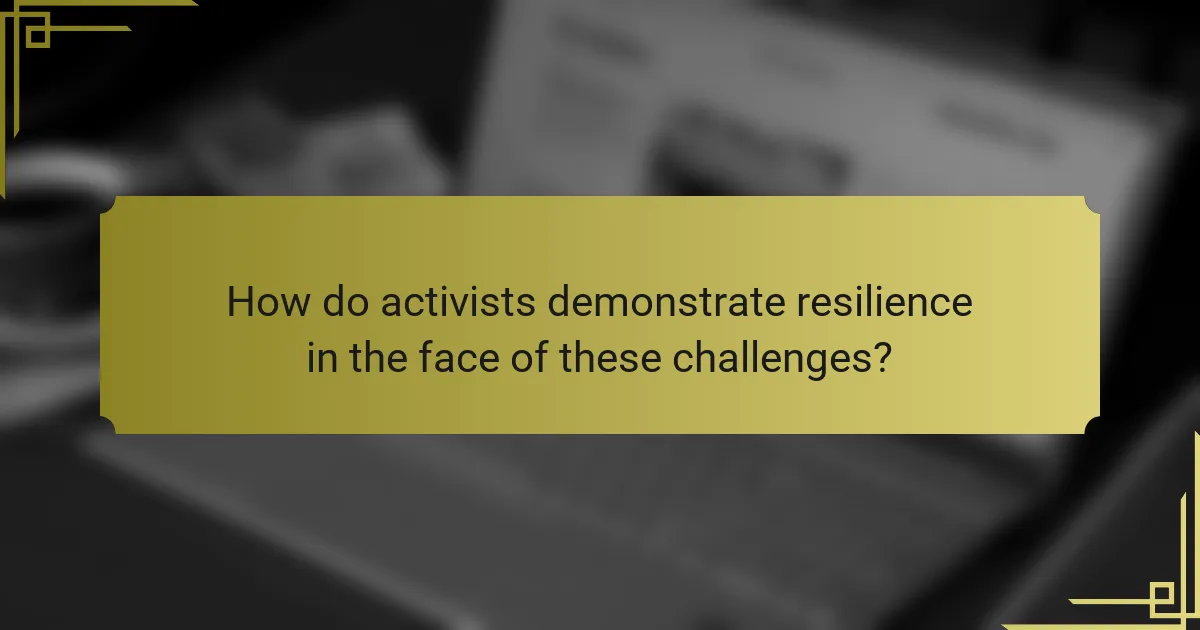
How do activists demonstrate resilience in the face of these challenges?
Activists demonstrate resilience by adapting strategies to overcome obstacles. They often build coalitions to amplify their voices. This collaboration enhances their capacity to mobilize resources and support. Activists also utilize social media for awareness and outreach. This platform allows them to share their messages widely and engage with global audiences. Moreover, they learn from setbacks and refine their approaches. This iterative process strengthens their resolve and effectiveness. Historical examples show that persistent activism can lead to significant change, such as the divestment movements in various contexts. These efforts illustrate how resilience is crucial for sustaining long-term advocacy.
What strategies do activists use to overcome obstacles?
Activists use various strategies to overcome obstacles in Sudan divestment efforts. They engage in grassroots mobilization to build community support. By educating the public, they raise awareness about the issues at stake. Coalition-building with other organizations amplifies their message and resources. Utilizing social media platforms helps them reach a wider audience quickly. They often leverage legal frameworks to challenge unjust policies. Fundraising campaigns provide necessary financial support for their initiatives. Strategic partnerships with influential figures can enhance credibility and visibility. Finally, persistent advocacy efforts ensure that their demands remain in public discourse.
How do grassroots movements contribute to resilience?
Grassroots movements enhance resilience by fostering community solidarity and collective action. They empower individuals to address local challenges collaboratively. This engagement builds trust and social networks among community members. For example, in Sudan, grassroots organizations have mobilized citizens against oppressive regimes. These movements provide a platform for marginalized voices, amplifying their concerns. Research indicates that communities involved in grassroots activism show greater adaptability to crises. By connecting people, grassroots movements create a support system that strengthens resilience. This interconnectedness allows for resource sharing and knowledge exchange, crucial during difficult times.
What role does collaboration with international organizations play?
Collaboration with international organizations plays a crucial role in enhancing the effectiveness of activism in Sudan divestment. It provides activists with access to global resources and networks. This collaboration facilitates the sharing of best practices and strategies among diverse groups. International organizations often lend credibility to local initiatives, attracting more attention and support. They can also assist in mobilizing financial resources for activism efforts. Furthermore, partnerships with these organizations can amplify the voices of Sudanese activists on international platforms. The involvement of international bodies can lead to stronger advocacy for policy changes. Overall, collaboration expands the impact and reach of activism in Sudan.
How do activists adapt their approaches in response to challenges?
Activists adapt their approaches in response to challenges by employing strategic flexibility. They assess the effectiveness of their current methods and modify tactics as needed. For instance, if traditional advocacy fails to yield results, activists may shift to digital campaigns. This adaptability allows them to reach broader audiences and engage supporters through social media.
In Sudan divestment efforts, activists have faced governmental repression. Consequently, they have turned to grassroots organizing to build local support networks. This approach fosters community resilience and empowers individuals to advocate for change. Additionally, activists often collaborate with international organizations to amplify their message.
By leveraging global platforms, they can attract attention to their cause and apply pressure on decision-makers. Historical examples, like the anti-apartheid movement, show that adaptive strategies can lead to significant change. Overall, the ability to pivot in response to challenges is crucial for activists’ success.
What innovative tactics have emerged in Sudan divestment activism?
Innovative tactics in Sudan divestment activism include strategic partnerships with global organizations. Activists leverage social media campaigns to raise awareness and mobilize support. They utilize targeted boycotts against companies linked to the Sudanese government. Grassroots organizing has increased community involvement in divestment efforts. Digital tools are employed for real-time reporting on human rights abuses. Collaborations with financial institutions promote ethical investment practices. Creative art and storytelling are used to humanize the impact of divestment. These tactics enhance visibility and pressure on decision-makers to act against the Sudanese regime.
How do activists leverage technology for their cause?
Activists leverage technology to enhance communication, mobilize support, and raise awareness for their causes. They utilize social media platforms to disseminate information rapidly. This allows them to reach a global audience effectively. Online petitions and crowdfunding platforms help in gathering resources and support. Activists also use encrypted messaging apps for secure communication. Data analytics tools help in understanding public sentiment and strategizing campaigns. The use of digital storytelling can humanize issues and engage more supporters. According to a 2020 report by the International Civil Society Centre, 73% of activists reported increased effectiveness through digital tools.
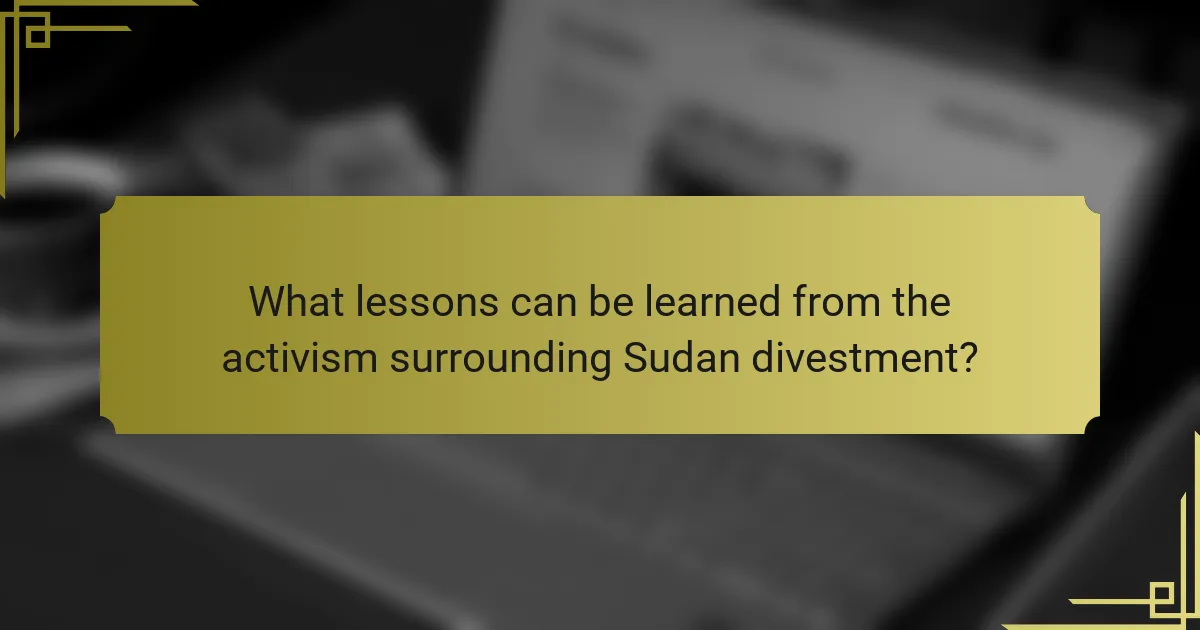
What lessons can be learned from the activism surrounding Sudan divestment?
Activism surrounding Sudan divestment teaches several important lessons. First, grassroots mobilization can effectively influence corporate behavior. For instance, campaigns led by organizations like Sudan Divestment Task Force prompted universities and pension funds to withdraw investments from companies operating in Sudan. Second, building coalitions strengthens advocacy efforts. Diverse groups united to amplify their voices against human rights abuses in Sudan. Third, persistence is crucial in the face of resistance. Activists faced significant pushback but continued to raise awareness and push for change. Fourth, leveraging social media can enhance outreach and engagement. Online platforms helped disseminate information and rally support globally. Lastly, the importance of transparency and accountability in corporate practices was highlighted. The activism revealed how financial ties could perpetuate human rights violations. These lessons underscore the effectiveness of organized, persistent advocacy in driving social change.
What best practices can be applied to future activism efforts?
Effective future activism efforts should focus on building strong coalitions. Collaborating with diverse groups enhances resource sharing and amplifies voices. Clear communication strategies are essential for maintaining transparency and engagement. Utilizing social media platforms can increase outreach and mobilization. Training activists in digital security protects sensitive information. Establishing measurable goals helps track progress and maintain accountability. Engaging with policymakers ensures that activism translates into actionable change. Continuous evaluation and adaptation of strategies improve long-term effectiveness.
How can activists build stronger coalitions for impact?
Activists can build stronger coalitions for impact by fostering inclusive dialogue among diverse groups. Engaging various stakeholders enhances understanding and collaboration. Establishing shared goals unites different entities toward a common purpose. Regular communication ensures transparency and trust within the coalition. Utilizing social media platforms amplifies outreach and mobilizes support. Training sessions can equip members with necessary skills for effective advocacy. Historical examples, such as the anti-apartheid movement, demonstrate the power of unified efforts. Research shows that coalitions with diverse representation achieve greater success in advocacy initiatives.
What are effective methods for raising awareness in challenging environments?
Effective methods for raising awareness in challenging environments include leveraging social media platforms. These platforms can reach a wide audience quickly. Utilizing local influencers can also enhance credibility and engagement. Collaborating with grassroots organizations helps build trust within communities. Hosting events or workshops fosters direct interaction and dialogue. Creating visually impactful materials captures attention and conveys messages effectively. Employing storytelling can humanize issues and resonate emotionally with audiences. Lastly, using data-driven campaigns provides factual backing to support claims and raise urgency.
How can individuals support activists in Sudan divestment?
Individuals can support activists in Sudan divestment by raising awareness and promoting education on the issue. They can share information through social media platforms to reach a wider audience. Participating in campaigns that call for divestment from companies operating in Sudan is also effective. Supporting organizations that focus on Sudan divestment can amplify activist efforts. Donating to these organizations provides them with necessary resources. Attending events or protests related to Sudan divestment demonstrates solidarity with activists. Engaging in conversations with local representatives about divestment pressures companies to reconsider their investments. Collaborating with other individuals and groups strengthens the overall movement for divestment.
What actions can supporters take to aid activist efforts?
Supporters can take various actions to aid activist efforts. They can raise awareness about the issues faced by activists in Sudan. This can be done through social media campaigns and community events. Supporters can also donate to organizations that support Sudanese activists. Financial contributions help sustain their efforts and provide necessary resources. Volunteering time and skills to these organizations is another impactful action. Mobilizing others to join the cause increases overall support and visibility. Engaging in advocacy by contacting policymakers can influence decisions related to Sudan divestment. Lastly, educating themselves and others about the challenges faced by activists is crucial for informed support.
How can awareness campaigns influence public opinion on Sudan divestment?
Awareness campaigns can significantly influence public opinion on Sudan divestment by educating the public about the issues at stake. These campaigns often highlight human rights abuses and the humanitarian crisis in Sudan. By providing factual information, they aim to evoke emotional responses and mobilize support. Social media, traditional media, and community outreach are common platforms for these campaigns. Increased visibility can pressure companies and governments to reconsider their investments. Research shows that public awareness can lead to increased activism and policy changes. For example, campaigns like “Divest Sudan” have successfully rallied support and prompted divestment from companies linked to the Sudanese government. This demonstrates the tangible impact of awareness on public sentiment and action regarding Sudan divestment.
The main entity of the article is the challenges faced by activists in Sudan divestment. The article outlines significant obstacles such as government repression, lack of transparency, economic instability, and public apathy that hinder activism efforts. It discusses the impact of political factors, social challenges, and economic barriers on activist strategies. Additionally, the article highlights how activists demonstrate resilience through innovative tactics, community support, and collaboration with international organizations, ultimately emphasizing the importance of grassroots mobilization and awareness campaigns in influencing public opinion and driving change.
